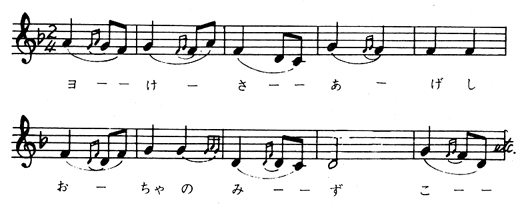Enka is short for the "Enzetsuka"(harangue song), product of liberty civil rights movement in the year of the Meiji. This is means of political insistence and advertisement entrusted to song criticism of clanship political. That is to say satiring song of political (protest song). The end of the 19th century, regulation about harangue became strictly, so Enka is sung in place of the speech. In this time come into fasion led by "Oppekepe-bushi", "Yattsukero-bushi", "Genkotsu-bushi" and so on.
*Yattsukero=beat, defeat
*Genkotsu=clenched fist
*bushi=melody
Oppekepe-bushi
Reading : Kenri kouhuku kiraina hito ni jiyu-tou woba nomashitai oppekepe oppekepe…below omission
*-tou=pun "party" "medicine"
Meaning : I want to let them take a medicine to be free people who do not like happy right .
Since this time called "Enka", is established.
Consists of the second half of the Meiji era, Enka became sentimental theme of society that was sung by Enka-shi, gradually shifted to the field of music from substitute speech.
Person appeared to compose using the technique of Western music in the Taisho era. It is the appearance of Shun'yo Tottori. He is the composer of "Kago no tori(bird cage)". It gain publicity.
Shun'yo Tottori "Suzuran" "Kago no tori" "Suttonton" 1924. 9
This sound is not so good…this is very old record disk
Please listen this!!
--------------------------------------------------------------------------------------------------------------------------
Now Enka
famous singer
Hiroshi Itsuki 五木ひろし
Aki Yashiro 八代亜紀
Saburo Kitajima 北島三郎
Kiyosi Hikawa 氷川きよし
Shinichi Mori 森進一
Yoshimi Tendo 天童よしみ
Huyumi Sakamoto 坂本冬美
Miyuki Kawanaka 川中美幸
Ichiro Toba 鳥羽一郎
Sayuri Isikawa 石川さゆり
Hibari Misora 美空ひばり
Yutaka Yamanaka 山川豊
Masao Sen 千昌夫
Takashi Hosokawa 細川たかし
Ikuzo Yoshi 吉幾三
Kaori Mizumori 水森かおり
Aki Yashiro 八代亜紀
Saburo Kitajima 北島三郎
Kiyosi Hikawa 氷川きよし
Shinichi Mori 森進一
Yoshimi Tendo 天童よしみ
Huyumi Sakamoto 坂本冬美
Miyuki Kawanaka 川中美幸
Ichiro Toba 鳥羽一郎
Sayuri Isikawa 石川さゆり
Hibari Misora 美空ひばり
Yutaka Yamanaka 山川豊
Masao Sen 千昌夫
Takashi Hosokawa 細川たかし
Ikuzo Yoshi 吉幾三
Kaori Mizumori 水森かおり
Hibari Misora "kawa no nagare no you ni"
It is a famous song, anyone know if the Japanese.
It is a famous song, anyone know if the Japanese.
This is a last single CD of her lifetime.
Ikuzo Yoshi "ora Tokyo sa ikuda"
This song is popular at niconico douga.
This is a song of lament singing Redneck envy Tokyo.
It is a very interesting song.
characteristic
kobushi : unique method of singing
vibrato : swinging the height of the sound
wear a kimono : in order to conserve the image of Japan
The contents of the lyrics "farewell, snow, rain, female, northern part of the country, sea, tears sake" is often discussed. There are many who sang sad and tragic love and affection between men and women.


without kobushi
characteristic
kobushi : unique method of singing
vibrato : swinging the height of the sound
wear a kimono : in order to conserve the image of Japan
The contents of the lyrics "farewell, snow, rain, female, northern part of the country, sea, tears sake" is often discussed. There are many who sang sad and tragic love and affection between men and women.

instance of kobushi

without kobushi
vibrato


No comments:
Post a Comment